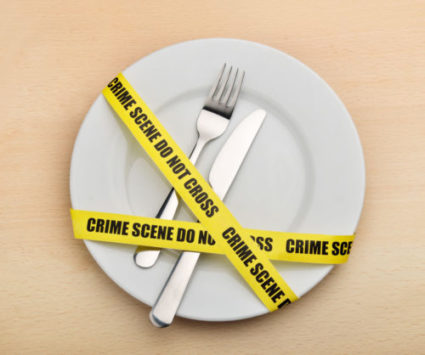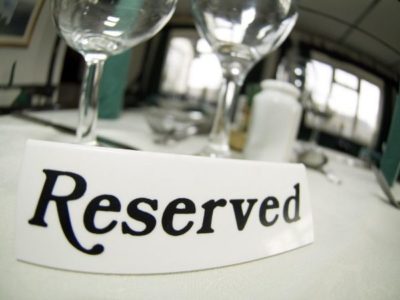Researchers concluded in a recent study of food allergies that in the U.S. the number of adults who think they have a food allergy is double the amount that really do. The study determined that 19% of adults think they have a food allergy yet only 10% of the population actually have one. Though some might find these results eye-opening, they come as no surprise to anyone who works in restaurants. In fact, the study confirms what most of us have known all along: that a significant portion of the dining public, whether intentionally or not, misrepresent their dietary restrictions.
Twenty years ago, restaurant menus were written with very little concern for food intolerances. You had the occasional nut allergy, or nut job, and maybe a few scattered lactose-intolerant teenagers. Once in awhile, someone on Weight Watchers or Jenny Craig might ask you to prepare their food without butter or an elderly person with high blood pressure might ask you to go easy on the salt. Life was a lot simpler back then.
Today, chefs have little choice but to plan their menus around the dizzying number of food trends—gluten-free, dairy-free, Vegan, Paleo, Keto, low-carb, raw foods. Menu items are designed to be retro-fitted to the nuances of endless dietary preferences. Our guests’ rapidly changing eating habits create many challenges for front and back of house. Interacting with guests who have special dietary needs has become a much more complex conversation. To make this interaction go a little more smoothly, here are EIGHT ways to better engage waitstaff when communicating food allergies in restaurants:
Don’t apologize – Food allergies are common these days so you have no reason to feel that calling attention to yours is an imposition. There are occasions when it’s challenging for servers to deal with the subleties of your diet, so show a little patience. As long as you aren’t embellishing, though, you have no reason to be asking anyone’s forgiveness. Profusely apologizing never feels genuine to servers and you risk coming across like you say the same thing every time you dine out. Servers are very busy, so cut to the chase. The more direct you are about your allergies, the easier it is for them to understand what information they should be conveying to the kitchen.
Never expect restaurants to know more about your food allergies than you do – Restaurants go to great lengths to educate their staff about the menu, but we are not medical professionals or nutritionists. Chefs often use ingredients they buy from third parties and it’s unrealistic to expect them to know if every one of these products is safe for you to eat. If we don’t make these things in our kitchen, we cannot be certain of what’s in them. When you are unfamiliar with an ingredient, it’s fine to ask “What is farro?” but don’t expect servers to authoritatively answer when you ask “Is farro safe if I can’t have gluten?” You should educate yourself about these ingredients rather than relying on servers and chefs who may not have the same expertise about certain allergens. If anything feels like a risk, order something else.

Never conflate dietary preferences with serious food allergies – Your deciding to go Vegan for the first two weeks in February shouldn’t bring a busy kitchen to a grinding halt while your sever interrupts the chef to have a ten minute conversation about the contents of every dish you ordered. Too often, when guests overstate their dietary preferences, it leads to a much more exhaustive inquiry than is necessary. It’s maddening to waiters when they jump through hoops to protect people from an ingredient like butter, ask the chef to make all of their food without it, then if one dish can’t be made without butter, they say “Oh, a little butter is fine.”
Don’t use phony allergies to manipulate changes to the menu – The script is always the same: A guest asks for something to be changed initially and then—when the answer is no—claims to be allergic to an ingredient in the dish they don’t like. This is usually followed by a tantrum about how unfair it is that the restaurant won’t accommodate people’s food allergies. Credibility is important if you want people serving you to take your dietary restrictions seriously. We don’t take food allergies lightly so don’t play games. You might get what you want but not without branding yourself a troublemaker.
Notify your server of your allergies before you order – Food is routinely sent back when diners assume that because an ingredient wasn’t printed on the menu that the dish must not contain it. It’s ultimately your responsibility to tell your server when you place the order so that he can confirm your safety with the kitchen. Even better, when you make a reservation include dietary restrictions on your guest notes (either when you book online or by phone). Do not think you’re being difficult. Returning food in the middle of your meaI is far more difficult than having a brief conversation about your allergies with your server when you first sit down.
Be clear about the severity of your allergic reaction – Not all food allergies are created equally. Garlic giving you gas is not the same as someone going into anaphylactic shock from eating peanuts. A guest recently put an Epi-pen on the table to make sure his server understood the seriousness of his shellfish allergy. It was a little melodramatic, but he definitely got his point across. Servers can become complacent as people frequently exaggerate their dietary restrictions. Making the severity of your allergy clear in the language that you use (“It’s life-threatening” or “I can get very sick from cross-contamination” ) will hopefully circumvent any risk of complacency. Your server may be annoyed, but they definitely don’t want someone dying at their table.

Don’t expect that every dish on the menu can be made to accommodate your diet – Many ingredients on the menu are prepared in advance. If mushrooms have already been sautéed in butter beforehand and you are intolerant of dairy, do not expect the kitchen to stop what they are doing to slice and sauté a separate batch of raw mushrooms in olive oil for you. The server will politely offer to remove the mushrooms and you should be agreeable or, if that’s not what you want, consult with the server and order something else.
Restaurants don’t owe you anything just because you have an allergy – You should never expect a restaurant kitchen to behave like your home kitchen. Try cooking for a hundred different people in your home and see how much time you have to tailor the food you make to everyone’s unique dietary needs. Most chefs do the best they can to accommodate dietary restrictions within the confines of a commercial kitchen. Respect that.



 You need a connection to get in – Some restaurants like Rao’s in New York City only open their doors to insiders. You either know someone who has a table there or you’re eating somewhere else. Loyalty is the best way to build these relationships. That’s how they did it back in the day at Rao’s and that’s how they do it now everywhere else. Don’t expect preferred status without earning it. Restaurant relationships are just like relationships you have with significant others. Expecting intimacy without trust leads to rejection. Take time to get to know the staff, tip them well and eventually, if you’re lucky, they’ll be ready to consummate the relationship.
You need a connection to get in – Some restaurants like Rao’s in New York City only open their doors to insiders. You either know someone who has a table there or you’re eating somewhere else. Loyalty is the best way to build these relationships. That’s how they did it back in the day at Rao’s and that’s how they do it now everywhere else. Don’t expect preferred status without earning it. Restaurant relationships are just like relationships you have with significant others. Expecting intimacy without trust leads to rejection. Take time to get to know the staff, tip them well and eventually, if you’re lucky, they’ll be ready to consummate the relationship.